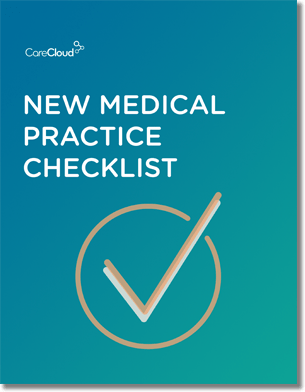Before most large medical practices find the best electronic health record system for their needs, they research many choices and find some discouraging up-front costs.
However, the transition doesn’t have to be as complicated, costly and painful as it seems. Many medium to large medical practices find web-based EHR systems the perfect solution for their clinical and operational needs.
Cloud-Based EHR vs. Client-Server
EHR systems basically fall into two categories: cloud-based or client-server. Cloud-based systems store a practice’s data on external servers. Physicians, practice managers and other authorized staff can access information via the web, requiring only a computer or mobile device with a secure Internet connection.
Client-server systems store data in-house, requiring a server, hardware and software installed in the physician’s office. Despite the historic popularity of in-house servers, medical practices are increasingly switching to the cloud for a number of reasons.
Benefits of Cloud Based EHRs
1. Simpler implementation
EHR software running on the web does not require hardware or software installation. Also, because implementation often goes faster with cloud-based systems, practices can decrease interruption of cash flow and get a faster return on investment compared to traditional client-server systems.
2. Tremendous up-front savings
The cost of EHR installation remains a major consideration for many medical practices. Client-server systems can cost $40,000 or more to set up – and that’s for small practices. Then add the licensing fees, maintenance costs, updates and patches on top of that.
Because cloud-based EHRs require no installation of hardware or purchase of software licenses, implementation typically comes in at a fraction of the cost. Practices pay a monthly fee, like a utility bill, as part of an arrangement called software as a service (SaaS).
3. Significantly reduced IT requirements
When practices move medical records to the cloud, they no longer need their own team of IT experts to install, configure, test, run, secure and update hardware and software. Instead, the cloud-based SaaS provider handles all of these tasks. Web-based systems also provide automatic updates, so practices continue to run on the most up-to-date software available.
4. Superior accessibility and collaboration
Cloud software users can securely log in to the system from anywhere on any device with a secure Internet connection. Accessing the system outside of the office allows physicians, staff and patients to collaborate more effectively and to achieve better care coordination.
5. Simplified scalability
Large medical practices can expand on the cloud without the standard IT growing pains. A web-based EHR system eases the addition of new users, doctors or locations. The flexibility of web-based software allows medical practices to think big and grow, without breaking the bank.
Are Web-Based EHR Systems Safe?
Some physicians skeptical about cloud-based EHR systems cite security as a concern. While the uncertainty is understandable, web-based EHR systems can actually deliver greater security than client-server systems and paper records.
Web-based EHR systems meet HIPAA compliance through data centers with bank-level security and high-level encryption methods that make data unreadable – even if a security breach occurs. Client-server systems often remain unencrypted and only as secure as the room or closet where a practice stores them.
Cloud-based data is safer than paper and client-server records in the event of a natural disaster or fire. Cloud data remains backed up securely in multiple locations. Unlike cloud systems, backups for client-server records are most vulnerable to breach during transport to storage facilities.
Most people already trust the cloud to store a great deal of their sensitive data. Email systems like Gmail and Yahoo! use cloud storage. Personal information for online banking, shopping and on social sites like Facebook get stored in the cloud as well.
Ultimately, cloud-based EHR systems give users of all sizes and industries great advantages in cost savings, data accessibility and security. No matter which solution works best for your medical practice, choosing an EHR certified for Meaningful Use can help you meet the criteria for financial incentives and avoid meaningful use penalties.
Shawn McKee contributed to this post.

Do you know what you need when setting up a new medical practice?


